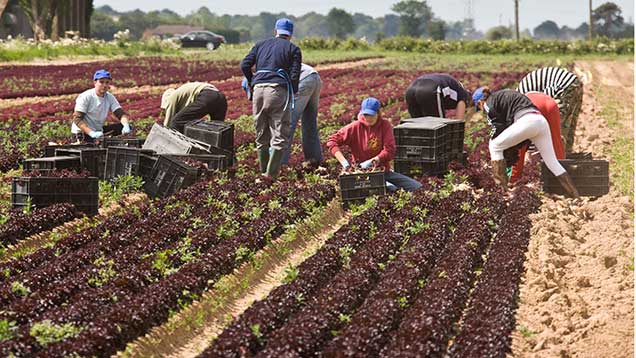Scottish grower profits could be ‘eliminated’ by wage rise
 © Tim Scrivener/Rex Shutterstock
© Tim Scrivener/Rex Shutterstock Profit margins could be “eliminated” for Scotland’s soft fruit and vegetable growers if retailers do not shoulder their share of the new living wage when it kicks in next year, warns NFU Scotland (NFUS).
Fear is growing among Scottish growers that they will be put at a competitive disadvantage to their English counterparts from 1 April, because wage rule changes mean they will pay at least 50p/hour more for younger workers.
This could wipe out profits in soft fruit and vegetable sectors, where wages represent more than 40% of operating costs, said NFUS.
See also: Farm leaders concerned about effect of ‘living wage’
The new living wage in England will only apply to workers above the age of 25. But Scotland still has an agricultural wages board, which is not banded by age, but by time employed.
This means that workers in Scotland will all have to be paid the new national living wage of £7.20/hour – regardless of age.
Growers raise fears
Some of Scotland’s top growers met with NFUS earlier in the week, where concerns were raised about whether retailers would pay extra for Scottish produce or whether growers would be expected to absorb the cost.
NFUS chief executive Scott Walker said: “[The] meeting brought together some of the most innovative and important growers of soft fruit and vegetables in Scotland but it is clear from discussions that they cannot carry the burden of higher wage bills compared with other parts of the UK without retailers recognising this through higher prices for our produce.
“The living wage will see any profit margin eliminated unless Scottish growers can recover the extra cost they face through the products they sell.
“If this doesn’t happen, then there will be less Scottish fruit and vegetables produced.
“The Scottish government also needs to declutter the employment legislation around farming. We simply want to see agricultural businesses treated in the same way as all other employers.”
How much will Scottish growers have to pay workers?
The Scottish agricultural minimum wage does not have age bands but is instead split so that those in the first 26 weeks of employment are paid a minimum of £6.70/hour and those with more than 26 weeks of employment are paid a minimum of £7.24/hour.
The up-to-26-week-of-employment rate will rise from £6.70/hour to £7.20/hour to accommodate the new living wage.
This means, for example:
- An 18-year-old working in Scottish agriculture will have a minimum wage of £7.20/hour, whereas in England it will be £5.30/hour
- A 24-year-old working in Scottish agriculture will have a minimum wage of £7.20/hour, whereas in England it will be £6.70/hour
Next steps
Mr Walker added: “We will meet with retailers to discuss our concerns and to look at what can be done to secure the Scottish supply chain.
“And we are organising meetings for politicians on fruit and vegetable farms to help explain the impact of wage proposals on growers in Scotland.”

